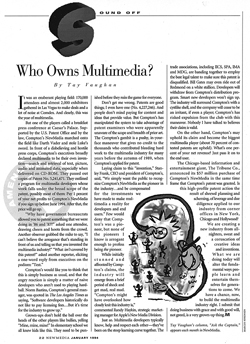|
Vaughan Family Timestream® Maps |
| Home Biography People Places Multimedia: Making It Work On the Water Writings/Presentations |
Compton's Patent
Who Owns Multimedia?
I witnessed an amazing multimedia event in the fall of 1993. On an exuberant playing field at Las Vegas, 170,000 computer people and almost 2,000 exhibiting companies gathered to make deals and a lot of noise at the annual COMDEX trade show. This was the year of multimedia, the year when decades of creative and technical effort from thousands of brilliant hardware and software developers around the world would pay off--finally and clearly, there was a marketplace for their wares.
But one of the players marched onto the field like Darth Vader and stole the game ball. In front of a disbelieving and hostile press corps, Compton's NewMedia broadly declared multimedia to be their own invention--search and retrieval of text, picture, audio, and animated data, especially when delivered on CD-ROM. They passed out copies of their Patent No. 5,241,671 and said "Read it." And they outlined a program for multimedia developers whose work falls under the broad scope of the patent, possibly most developers: pay one percent of your net profits to Compton's NewMedia if you join our special program before June, 1994. After that, the price will go higher. "Why have government bureaucrats allowed you to patent something that we were doing in '86 and '87?" asked an attendee, gleaning cheers and hoots from the crowd. Another observer grabbed the mike to say, "I can't believe the arrogance that's standing in front of us and telling us that YOU invented the multimedia industry!" "What ISN'T covered by this patent?" asked another reporter, culling a one-word reply from executives on the podium: "text."
Compton's would like you to think that this is simply business as usual, and that the angry response to the announcement is simply a matter of naive developers who aren't used to playing hardball. Norm Bastins, Compton's general manager, was quoted by Amy Harmon in The Los Angeles Times saying "software developers historically do not like to pay licensing fees.... But it's time for the industry to grow up...."
Uh uh. Grown-ups today are making multimedia alliances and are nurturing the industry, not holding their colleagues hostage and demanding money. Grown-ups don't hold the game ball over the heads of the other players like spoiled schoolyard bullies, yelling "Mine, mine, mine!"
Don't get me wrong. Patents are good things; I even have one (No. 4,227,246). And the people I know in the multimedia industry don't mind paying real money for software, hardware, talent, content, and ideas that provide value. But Compton's has manipulated the system and taken advantage of patent examiners who were apparently unaware of the scope and breadth of prior art. Compton's gambit is a pushy, grabby, shockingly in-your-face maneuver that gives no credit to the many thousands who have contributed bleeding hard work to the multimedia industry for many years before autumn of 1989, when Compton's applied for their patent.
Laying claim to their "invention," Stanley Frank, CEO and president of Compton's, says "We simply want the public to recognize Compton's NewMedia as the pioneer in the industry...and be compensated for the investments we have made to make multimedia a reality for developers and end users." Few would deny that Compton's was a pioneer, but none of the pioneers I know is arrogant enough to profess being THE pioneer.
While initially stunned and affronted by Compton's claims of invention and their strategy for taxing multimedia, like mugging victims, the industry will emerge from a brief period of shock and get mad, real mad. "Compton's might have overlooked how closely knit this industry is,"commented Randy Haykin, Strategic |Marketing Manager for the New Media Division at Apple.
Just so. Multimedia developers typically know, help, and respect each other--they've been on the steep learning curve together. We are growing a new industry from hard work, sweat, all-nighters, and a coruscation of creative ideas and inventions. Indeed, what we are doing today will alter the fundamental ways people learn and entertain themselves for generations to come. We have a chance, now, to build the multimedia industry right. I submit that doing business with grace and with good will, not greed, is a very grown-up thing.
---
Portions excerpted from an opinion column by Tay Vaughan titled "The Compton's Patent: Who Owns Multimedia?" first printed in NewMedia magazine, January, 1994. (Note: In March, 1994, the U.S. Patent and Trademark Office rescinded this patent.)
